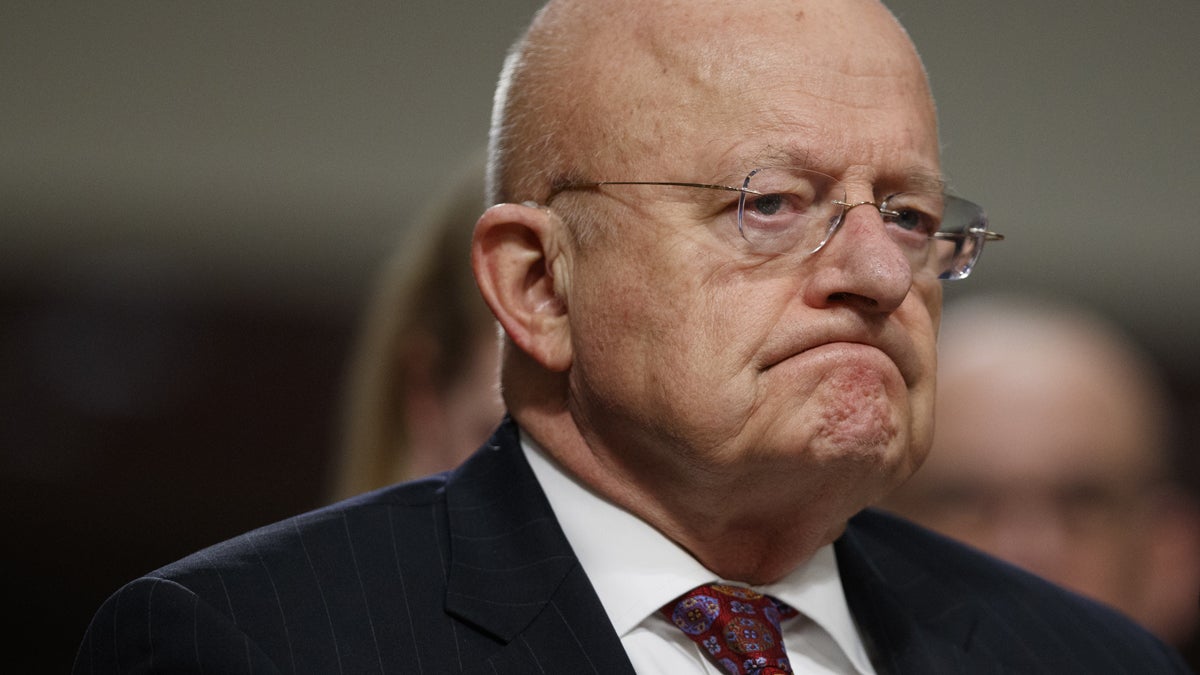Why have so many Republicans gone soft on Russia?

Director of National Intelligence James Clapper listens while testifying on Capitol Hill in Washington
Once upon a time, Republicans were united in their hawkishness toward Russia. Their big shtick was vigilance, as best evidenced by their ’84 TV ad that depicted a bear rampaging through the woods while the narrator intoned the metaphor:
“There is a bear in the woods. For some people, the bear is easy to see. Others don’t see it at all. Some people say the bear is tame. Others say it’s vicious and dangerous. Since no one can really be sure who’s right, isn’t it smart to be as strong as the bear? If there is a bear.”
Some Republicans still hew to that belief — John McCain, who calls Russia’s election cyberinvasion “an act of war,” is conducting a Senate hearing today — but what’s astounding is how many Republicans have morphed into surrender monkeys, shrugging off Vladimir Putin’s hackattack and hailing him as a great leader. In the words of Republican foreign policy advisor Daniel Vajdich, “It is dizzying. It’s just totally unexpected and counterintuitive to see how Republicans have shifted.”
McCain has hawkish party allies who want to punish Russia with new sanctions. Republican strategist John Weaver says that McCain “is outraged that a murderous thug KGB man was able to attack our democracy and so far be able to sit back in Moscow.” Evan McMullin, an ex-CIA officer and Capitol Hill Republican who ran for president in ’16 as an independent, tells The Wall Street Journal that we shouldn’t break bread with Putin until Russia halts “its active assaults on liberal democracy in the West.”
But the GOP’s soft-on-Russia faction is clearly ascendant, notably at the grassroots level. According to an Economist/YouGov poll conducted two years ago, only 10 percent of rank-and-file Republicans viewed Putin favorably; 51 percent viewed him very unfavorably. But their mood has markedly softened. In a poll last month, 37 percent viewed him favorably; only 14 percent, very unfavorably.
Why has this happened? Why have so many Republicans, who for decades took pride in their national security muscularity, suddenly become doormats? Five reasons:
Trump is setting the tone. A political party tends to follow its victorious leader, and right now the GOP is led by a Putin pet whose Russian business entanglements have yet to be fully disclosed. If any other president-elect (especially a Democrat), in any previous year, had attacked America’s intelligence agencies and sided with Russia, Republicans would’ve lined up to scream treason. But Trump’s unexpected win has redefined their patriotism.
Putin’s cyberinvasion hurt Hillary Clinton. It’s an old story: The enemy of the enemy is a friend. Republicans are simply grateful that the thug helped propel them to power.
Macho titillation. Lots of Republicans envy Putin’s decisive authoritarian prowess. In the words of Trump ally Rudy Giuliani, “He makes a decision and he executes it, quickly. That’s what you call a leader.” (A pity that Rudy used the word execute.)
Conservative cultural affinity. Lots of Republican social conservatives love Putin’s hostility to gay people. In Russia he pushes for anti-gay and anti-abortion legislation; indeed, as former U.S. ambassador Michael McFaul tells Politico, “Putin sees himself as the leader of the conservative world, battling decadent liberal values.”
Geopolitical strategery. (The latter word was coined by Bush.) Some Republicans — most notably, incoming national security advisor Michael Flynn — believe that we need to cultivate Russia as our crucial ally in the war on terror. At a dinner in Moscow one year ago, Flynn said: “We have to begin to understand that is not an East-West world, folks. This is actually more of a North-South world … The Number One goal is to eliminate the cancerous idea that exists inside of the Islamic religion.”
These reasons — and there are others, like the ties that bind corporate American leaders and Russian oligarchs — help explain why so many Republicans are so passive about the historic tampering of an American election; and why Republican leaders on Capitol Hill are so resistant to the creation of a special investigative committee. (McCain ally John Weaver, referring to Trump’s team: “They’re certainly acting like there’s something to hide.”)
And this Republican passivity is great for Putin and his expansionist aims. The other night on Fox News, Trump apparatchik Tucker Carlson mused, “Why is it in my interest to send my 19-year-old son to defend the Baltics?” First of all, his son doesn’t have to go; we have a volunteer army. But the real answer is, America is part of NATO, Baltic states like Estonia are part of NATO, and we’re required to defend NATO allies if they’re attacked. But Trump has been dissing our traditional NATO commitments.
McCain and the other hawks aren’t going away. At today’s Senate hearing he said: “Every American should be alarmed by Russia’s attacks on our nation. There’s no escaping the fact that this (was) an unprecedented attack on our democracy.” And hawkish Republican commentators continue to weigh in. Ben Shapiro writes, “The full-scale embrace of Putin … should be disquieting to any American who still gives a good damn about the notion of a powerful America expanding the borders of freedom rather than surrendering them to authoritarian dictators.”
But their voices don’t resonate like they once did. Who could ever have predicted that the tough-on-Russia party would slide toward appeasement? That Ronald Reagan would yield to a whiff of Neville Chamberlain?
—
Follow me on Twitter, @dickpolman1, and on Facebook.
WHYY is your source for fact-based, in-depth journalism and information. As a nonprofit organization, we rely on financial support from readers like you. Please give today.

